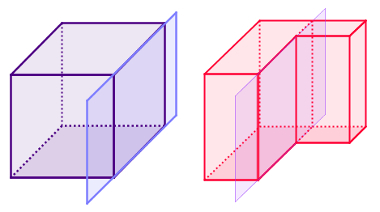Factorization in polynomials is a mathematical content that brings together techniques to write them in the form of a product between monomials or even among others polynomials. This decomposition is based on the fundamental theorem of arithmetic, which guarantees the following:
Any integer greater than 1 can be decomposed
in a product of prime numbers.
The techniques used to factorize polynomials – calls from cases in factorization – are based on the multiplication properties, especially in the distributive property. The six cases of factorization of polynomials are as follows:
1st case of factorization: common factor in evidence
Note, in the polynomial below, that there is a factor repeating itself in each of its terms.
4x + ax
to write this polynomial in the form of a product, put this factor repeating in evidence. For this, it is enough to do the inverse process of the distributive property as follows:
x (4 + a)
Note that by applying the distributive property on this factorization, we will have just the polynomial initial. See another example of the first factorization case:
4x3 + 6x2
4x3 + 6x2 = 2·2xxx + 2·3xx = 2xx (2x + 3) = 2x2(2x + 3)
For more information about this factoring case, see the text Factoring: Common factor in evidenceon here.
2nd case of factoring: grouping
It may be that, when placing factorscommon in evidence, the result is a polynomial which still has common factors. So, we must take a second step: bring common factors to the fore again.
Thus, factoring by grouping is pairfactorization by common factor.
Example:
xy + 4y + 5x + 20
at first factorization, we will highlight the common terms as follows:
y (x + 4) + 5(x + 4)
Note that the polynomial resulting has, in your terms, the common factor x + 4. putting it in evidence, we will have:
(x + 4)(y + 5)
Do not stop now... There's more after the advertising ;)
For more information and examples about this case of factorization, see the text groupingclicking here.
3rd case of factorization: perfect square trinomial
This case is basically the opposite of productsremarkable. Note the noteworthy product below:
(x + 5)2 = x2 + 10x + 25
At perfect square trinomial factorization, we write polynomials expressed in this form as a remarkable product. See an example:
4x2 + 12xy + 9y2 = (2x + 3y)2
Note that you need to ensure that the polynomial is really a perfect square trinomial to do this procedure. Processes for this warranty can be found on here.
4th factorization case: difference of two squares
Polynomials known as two square difference have this form:
x2 - a2
Its factorization is the remarkable product known as product of sum for difference. Note the result of factoring this polynomial:
x2 - a2 = (x + a)(x - a)
For more examples and information about this case of factorization, Read the text two square difference on here.
5th factorization case: difference of two cubes
all polynomial grade 3 written in the form x3 + y3 Can be factored in the following way:
x3 + y3 = (x + y)(x2 – xy + y2)
For more examples and information about this case of factorization, Read the text two cube differenceon here.
6th case of factorization: Sum of two cubes
all polynomial grade 3 written in the form x3 - y3 Can be factored in the following way:
x3 - y3 = (x - y)(x2 + xy + y2)
For more examples and information about this case of factorization, Read the text sum of two cubeson here.
By Luiz Paulo Moreira
Graduated in Mathematics
Would you like to reference this text in a school or academic work? Look:
SILVA, Luiz Paulo Moreira. "What is Polynomial Factorization?"; Brazil School. Available in: https://brasilescola.uol.com.br/o-que-e/matematica/o-que-e-fatoracao-polinomios.htm. Accessed on June 27, 2021.
Factorization, Algebraic Expression Factorization, Algebraic Expression, Sum of Two Cubes, Difference of two squares, Difference, Cube root, Factoring with Difference of two cubes, Difference of two cubes.
Algebraic expression factorization, Binomial, What is binomial, Factored form of algebraic expression, Sum and product of expressions, 5th case of factorization, Subtraction.
Math

Common factor, Algebraic expression, Evidence term, Factorization, Algebraic expression factorization, Grouping, 2nd factorization case, Factorization case, Grouping of similar terms.
Learn the definition of polynomial equation, define a polynomial function, the numerical value of a polynomial, the root or zero of the polynomial, Degree of a polynomial.


